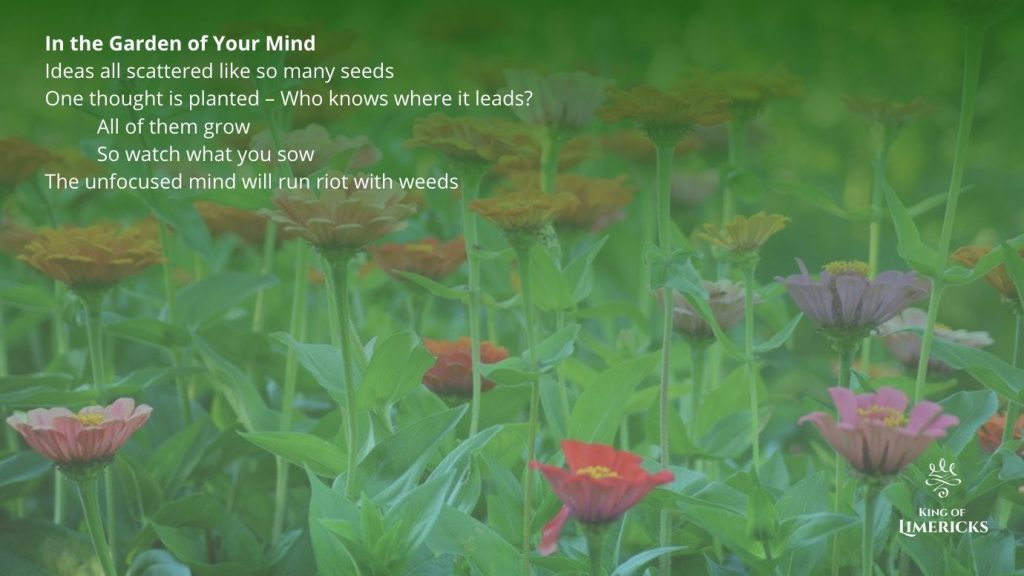
Evergreen Limericks about Gardening
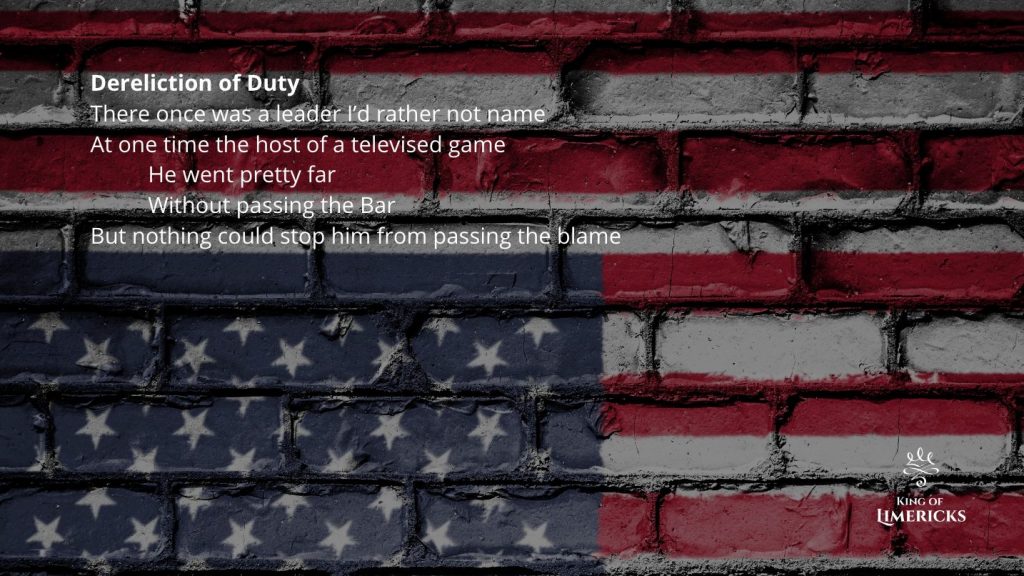
Limericks about Politics in America
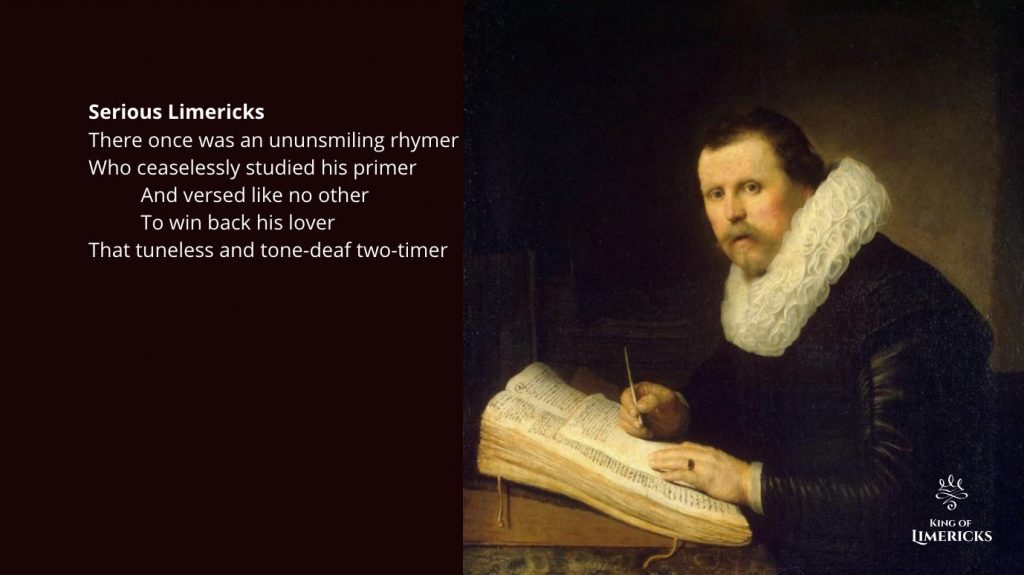
The limerick is a relatively simple form of poetry. It has five lines in which the first, second and fifth lines rhyme together; and the third and fourth lines, which are a few syllables shorter, also rhyme together. But does a limerick have to be funny?
Traditionally, limericks tend to humorous, often examining matters of the off-color and the unsavory. But there’s no reason you can’t write a serious limerick.
The trick to writing a good limerick is to get the meter right. Anapestic meter, as it’s known in poetry circles, has something of a gallop to it. It goes something like da-da-DUM da-da-DUM da-da-DUM. You might also think of it as the Dr. Seuss meter. Although he wasn’t a strict adherent, and he played around with a lot of variations.
For a more complete and comprehensive explanation, check out my article: What is a limerick and how do I write one?
Cognitive dissonance of a serious limerick
But the fact is, there’s something fun and whimsical about the rhythm and rhyme scheme of a proper limerick. Writing a serious limerick therefore creates a kind of cognitive dissonance which hopefully makes the reader want to roll the verse around in their mind for moment or two.
It can be a challenge to write a serious limerick though. Even if you set out with a sober topic, the sound of the short verse might produce a kind of dark humor effect. For example, when I decided to write this article, I sat down to write the most humorless poem possible. But look what happened.
Serious Limericks
There once was an unsmiling rhymer
Who ceaselessly studied his primer
And versed like no other
To win back his lover
That tuneless and tone-deaf two-timer
OK, so it’s not exactly a knee slapper. But neither does it send you reaching for a box of Kleenex the way a story of unrequited love and infidelity otherwise might.
The use of poetry and metaphor to express a paradox that defies ordinary language goes back to the earliest Myths and Fairy Tales. And that tradition runs right up through Melville and into the modern era. Although sometimes it looks like we in the Digital Age have lost the ability to decode those cryptic metaphors.
Partial Eclipse of the Heart
Spirit today is confined behind fences
Occluded by science obstructing our senses
A matter of treason
For overmuch reason
Conforming to only the concrete consensus
Even the title of my website is meant to reinforce this element of cognitive dissonance. The King of Limericks has an ironic flavor to it. Unlike the Grandfather of Cinema or the Queen of the Nile — titles which confer great importance — the King of Limericks suggests major prowess in an insignificant arena. More like the Prince of Pawns or the Tsar of Trifles. Although, after a lifetime of limerick writing, one can acquire a degree of mastery, even in a seemingly trivial genre.
In fact, I have hundreds of limericks about everything from German Idealism to Eastern Mysticism to Manic Depression. These serious subjects are not always easy to grapple with. But the challenge of rolling them into tidy little limericks brings a commensurate reward.
Metaphysical limericks
What I really like about serious limerick writing is the way this whimsical form is able to maintain the levity. It keeps us from taking things too seriously, and that can be important. One of my favorite pastimes is writing metaphysical limericks. Metaphysics, after all, is topic riddled with paradox, so the dissonance adds one more layer of unspoken content.
Ride of your life
You exit this world as you enter: alone
Charging ahead on a path of your own
Single but bound
To the world all around
A party of one on a little blue stone
Here we have a five-line nugget dealing with loneliness, mortality and impermanence. And yet you’re left with no sense of despair. Instead, I hoped to express a feeling of untroubled acceptance. It takes the existentialist position to another level.
Being and Nothing
Some things are different and others are not
Separate or one with the whole cosmic lot
But the Being supreme
Is a bit like a dream
Where something and nothing are tied in a knot
As far as illustrating metaphysical paradoxes goes, this is one of my favorites. With Sartre and Parmenides looming in the background, the absurdity of the human experience is made explicit.
Sometimes rational thought alone is not enough to get you out of a problem. In philosophy and in life, there are times when we just get stuck. And all the level-headed thinking in the world can’t get you unstuck. That’s when we need a quick dash of poetry and a moment of self-contradiction.
Philosophical limericks
I already mentioned Parmenides and the existentialists, but the canon of Western philosophy is just teeming with juicy limerick material. And what could be more serious than an ancient Athenian? Just look at their beards. Enough bush to make a grown Hipster weep.
Nicomachean Ethics
Racing through life with an engine full throttle
A foot in the grave and a hand on the bottle
In search of right living
You should have been giving
A little more time to my friend Aristotle
Now this limerick might not sound 100 percent serious, but it’s really only the rhyme and rhythm that put a smile on the reader’s face. When you stop to look at it, the substance of the poem contains some seriously valuable advice.
The trouble with age old wisdom is not that it’s lost its value or relevance over the centuries. The problem is that the pages have grown brittle and the words have lost their immediacy. I like to think that limericks, short and sweet, can rescue some of that ancestral knowledge from Bronze Age obscurity and release it from the chains of stone-faced sophistry.
Serious yet accessible, limericks have the potential to revive those worn out words of wisdom. Consider the following example about Immanuel Kant.
The Metaphysical Challenge
A treasure of treatises weighs on my shelves
And into man’s knowledge it thoroughly delves
From here to Andromeda
We chart the phenomena
But nothing can capture the Things in Themselves
Religious limericks
If you’ve ever attended a church service, then you probably know how a positive and constructive message can get lost in the robes of pious severity. Somehow they’re able to fill a Sunday school class with fun and games. But once the followers reach a certain age, the scriptural messages must be delivered with joyless authority.
Would I be going too far if I said that my limericks had the power to bring my readers closer to God? Perhaps. But still, I’d like to think I’m helping them inch along on their spiritual journeys.
James Joyce has been a great source of inspiration in my career as a limericist. Reflecting on his seminal masterpiece, Ulysses, someone once said they couldn’t tell if it was meant to be a joke disguised as a religion, or a religion disguised as a joke. My religious limericks are a bit like that.
The Legacy of Shepherds
There’s a wandering tribe with a ban on baloney
In the deserts of Hebron their sheep could get lonely
While others built towers
They pondered for hours
Inventing a god who’s the one and the only
What could be more serious than the advent of monotheism? It’s a topic worthy of great attention. And I have nearly enough limericks about Judeo-Christianity to fill a brand new testament. But it’s in the Far Eastern traditions where the koans and paradoxes really get interesting. And the limericks they inspire are absolutely no joke.
The Sacred Syllable
A chant from within and the silence is broken
Notice the pineal gland has awoken
Releasing resistance
To merge with existence
We all become one when the Om has been spoken
Sad limericks
Beyond these deep and thoughtful jewels about life’s largest questions, I’ve also produced a heartbreaking bundle of limericks that are just downright sad. My father was an English teacher, and his passing was another impetus for me to raise my own writing ambitions.
An Empty Wound
Ten years passing, the loss of another
The father of two (myself and my brother)
I barely can register
The poignant expenditure
I honestly think I might never recover
Sadness, I believe, is not a feeling to escape, but an emotion to experience. Expressing such gloom in something as cheerful as a limerick is a sign of sincere affirmation.
Deep in the Fog
One day’s a bull’s eye, the next one’s a miss
The capstone of that or the bottom of this
But I can’t see tomorrow
Beyond the grey sorrow
While leaning in over the gaping abyss
Poetic license
Far be it from me to put an end to dirty limericks. I’ve got no shortage of them under my belt, and it’s proven to be a genre with unlimited stamina. But I also know that the neocortex is the largest erogenous zone in the human body. So you can whittle away your time daydreaming about a man from Nantucket, but I’ll be right here, holding my two contradictory ideas at the same time.
The Way of the White Whale
The whale is a fish and a mammal in one
As white has all colors and also has none
The grandest of creatures
With paradox features
Unknown and untouched by the light of the sun
Further reading
If you liked these serious limericks, feel free to let me know in the comments. And please consider sharing the article and subscribing to the blog. You might also enjoy:
- Limericks about Mathematics
- Limericks about Dostoyevsky
- Limericks about the New Testament
- Limericks about Moby Dick
- Fun facts about Limericks
And if you’re as serious about limericks as I am, you might also check out these scholarly articles:
- Lear’s Limericks and the Reversal of Nonsense
- A Structuralist Approach to Limericks
- Listening to Limericks
FEATURED PHOTO: Portrait of a Scholar, by Rembrandt (Wikipedia)

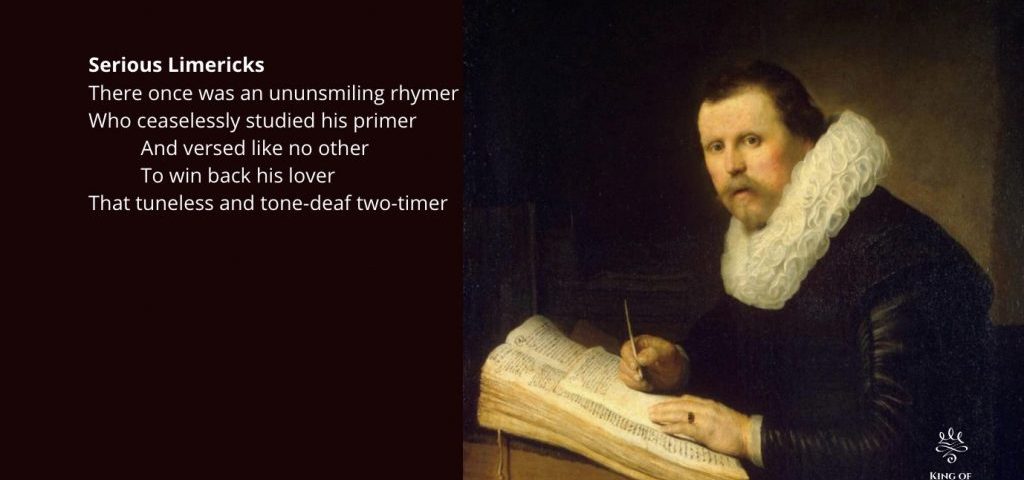


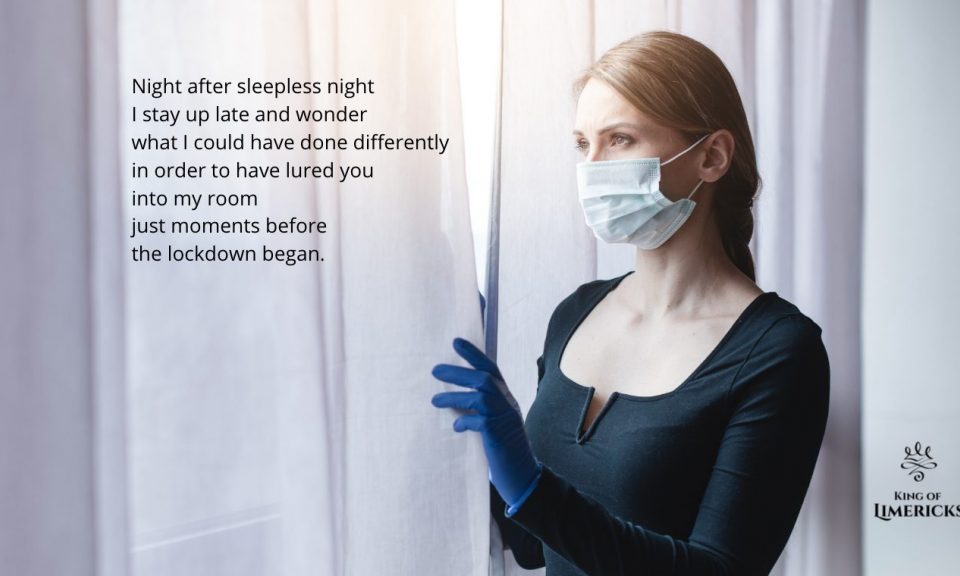

2 Comments
I like your White Whale poem. And while I didn’t know limericks trod on such ground as the lewd and the crude, I appreciate your efforts to use the genre in good and beautiful ways. Thank you 🙂
Thank you, Rachel!